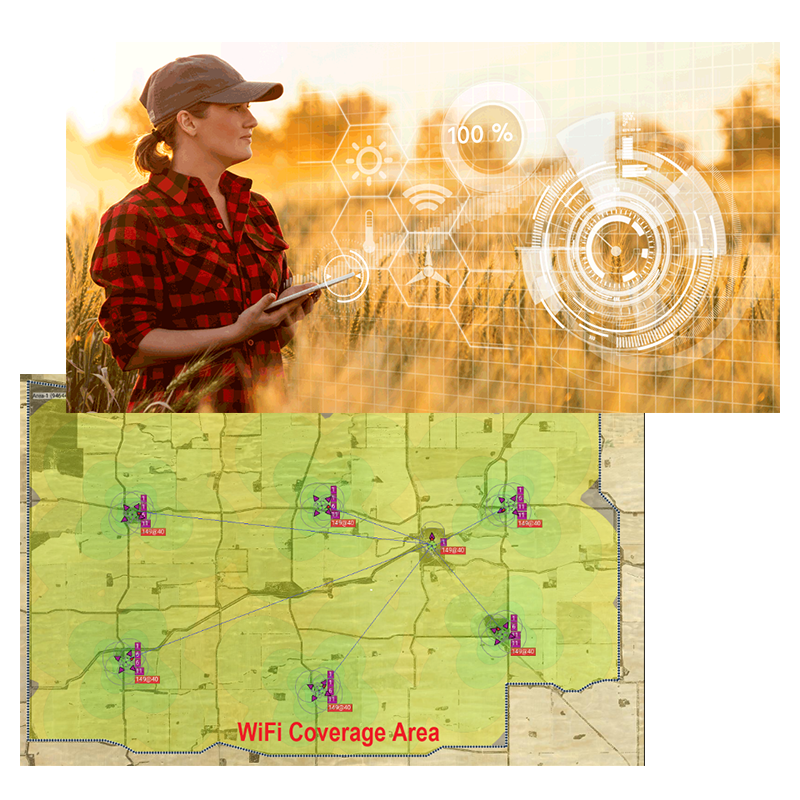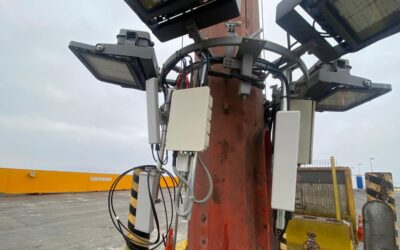Case Study
A farm in rural Australia now has long-range Wi-Fi thanks to idatanet
The Problem:
Most smart farming and Ag technologies are completely reliant on connectivity, be it for machine telemetry, data transfer or remote support.
However, in most regional and rural areas of Australia, mobile phone signal is virtually non-existent when away from towns and major thoroughfares. While satellite internet services are available high network latency (delays) along with low bandwidth and high cost of data can be a deterrent to those wanting to adopt smart farming applications.
Alternatively, LoRa or LP wireless networks can be deployed, but these are unsuitable for anything other than tiny amounts of data and undesirable in mission-critical environments.
Then there’s the issue or worker safety and how to ensure that staff can contact emergency services should an accident occur.
Various wireless solutions are available, however, only one provides the benefit of high- speed data, low latency, internet access, privacy and security, economical along with global standards allowing any compatible device with the correct password to connect to the network.
The Solution:
Long range, high capacity Wi-Fi is being adopted as the choice for robust wireless networking. Traditional Wi-Fi access points have a range of a few hundred meters, which is suitable for in and around homesteads and machinery sheds, but not much else.
Idatanet is the Australian distributor of Altai Super Wi-Fi technologies. Altai Wi-Fi networks are designed to work in the same ways as a typical mobile phone network, with long-range,
high-capacity base stations deployed around the property with integrated wireless backhaul or data links to the point of internet.
Base stations can be installed up to 12 kilometres apart in certain situations.
With a range of up to 1.7 kilometres from the base station to a smart phone, and up to 7 kilometres when used in conjunction with a low- powered portable, vehicle or machine mounted repeater.
The repeater provides a Wi-Fi bubble of up to 700 metres around the machine or vehicle.
A single LoRa gateway is installed on one of the base stations providing access to number of low-powered sensor devices.
Results:
Wi-Fi base stations are deployed with mast, free standing towers or trailer and skid mounted which can be fully self-contained including solar power for when mains power isn’t available. Blanket farm wide WiFi not only allows for the adoption of smart farming technologies it also has the added benefits of WiFi calling, SMS, email and internet access, CCTV and various sensors technologies. Repeaters have seamless handover and roaming between base stations allowing for movement between properties as well as the added benefit of able to be swapped between vehicles and assets.
“The solution was extremely cost effective compared to a private 4G LTE network or anything else which we were looking at. All of our existing phones and Wi-Fi equipment just connected easily. We now have internet access to the vehicles and headers across the entire property.”

Other Case Studies
Read our other IoT Solution Use Cases
Solar-Powered Super WiFi Network for Chilean Port
Case Study The perfect Wi-Fi solution for a large container port with limited installation sites.The Problem: Puerto Angamos is a significant port located in Mejillones of Antofagasta Region, the centre of Chilean mining region. It is a mono-operated, multipurpose...
Port Terminal Connectivity Solved in Côte d’Ivoire
Case Study Supporting daily operations in an ever-changing environmentThe Problem: The Côte d’Ivoire Terminal (CIT), is a project jointly developed by two leading global terminal operators, Bolloré and APM Terminals.It sits adjacent to the existing Abidjan



